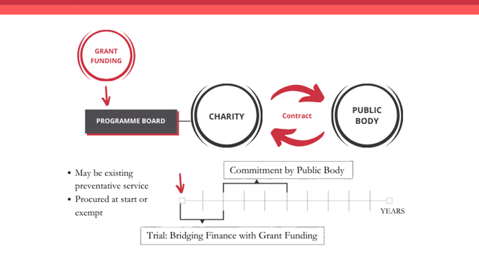First commissioned in 2019, the evaluation with Iconic Consulting and Glasgow Caledonian University aimed to generate learning around each component of the model, from the early design stage to the sustaining of services. For The Robertson Trust, we were particularly keen to better understand the role of an independent funder in system change and use the learning to inform future practice.
The model brought together a working partnership of public sector, third sector and funders. As opposed to the public sector partner taking the initial financial risk, SBF’s approach saw grant funding from independent sources being used to support a demonstration phase of an evidence-based service. This was underpinned by a contractual agreement between all partners that aimed to ensure the public sector sustained those services which successfully met agreed outcomes.

So, what have we learned over the past three years? Drawing on evidence from three projects – two in Dundee and East Renfrewshire which progressed with SBF, as well as one in South Ayrshire in which partners considered but did not apply the model – the evaluation highlighted SBF’s potential for supporting system change – but as an approach, rather than a fixed ‘off the shelf’ model.
Elements of the model were certainly identified as positive. In particular, the presence of an independent funder helped shift traditional power dynamics for third sector organisations, leading to greater equality when engaging with the public sector partner. Meanwhile, the shared focus from the beginning on evidence outcomes was shown to be important for building trust, refining the service model and clarifying goals.
However, what also became clear was that application of the model was not necessary or sufficient to encourage these elements. While the approach of SBF helps to put sustainability at the forefront, challenges and limitations of the model were also highlighted, particularly in the notion of a legally-binding contract for local authorities.
For those with an interest in this work, we would encourage you to download the full report and share thoughts with us via our communication channels, including social media and email. We remain interested in innovative funding approaches, particularly in relation to prevention, public service reform and social investment, and hope that the learning from this evaluation will add to the dialogue around these.
All materials related to Social Bridging Finance can be found here.
